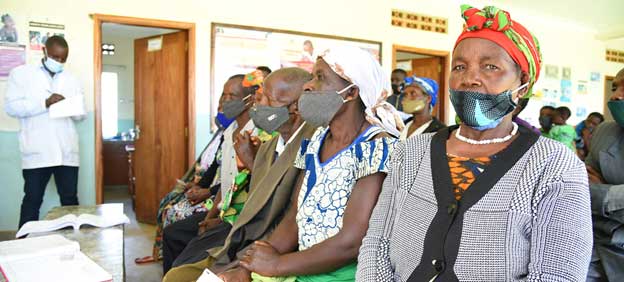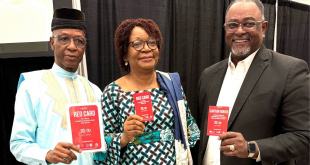UNITED NATIONS, Dec 20 2021 (IPS) – The 21-month-long corona virus pandemic has triggered three new phrases in the UN lexicon: “vaccine famine, vaccine apartheid and vaccine nationalism”.
And the largest number of victims facing the triple threats are from developing countries, mostly in Africa, as reflected in grim statistics.
Dr Richard Mihigo, coordinator for the WHO’s Immunization and Vaccines Development Programme in Africa, is quoted as saying that high-income countries are administering more booster doses than even vaccines that are being given in developing countries.
“Remember that we only have 8% — 8% — of people who have been fully vaccinated in this region,” he said, referring to Africa. “This represents around 103 million people in a continent of 1.3 billion.”
Achim Steiner, Administrator, UN Development Programme (UNDP), says that vaccines delayed is “development denied” for Africa. “Therefore, we must ensure vaccine equity which is the fastest way to end this pandemic”.
Rallying around the unifying strength of the UN, he pointed out, “we need the urgent cooperation of vaccine manufacturers, vaccine-producing countries and countries that already have high vaccination rates to tackle the acute vaccine supply shortage.”
Doing so will help to open-up economic and social opportunities across the (African) continent — boosting GDP and driving forward human development,” Steiner told a recent African Economic Conference in Cabo Verde.
Worldwide, says the New York Times, about 73% of shots that have gone into arms have been administered in high- and upper-middle-income countries, according to the Our World in Data project at the University of Oxford. Only 0.8% of doses have been administered in low-income countries.
Dr Djibril Diallo, President & CEO of the African Renaissance and Diaspora Network Inc, told IPS Article 25 of the Universal Declaration on Human Rights, ratified in 1948, recognized that the right to health is a human right.
“Now is a time when nations claiming to respect and uplift human rights are being tested. But, more so, it is in their own national interest to pass the test,” he said, pointing out that low inoculation rates are a root cause of the mutation of COVID-19 into new variants.
“From our experience with Delta, and now Omicron, we have seen, in our globally connected world, how swiftly and uncontrollably new variants spread’.
“It is a political fiction to believe that these variants can be contained before they reach a nation’s shore. Instead, we need to shift towards reducing the risks of new variants developing by ensuring that no one is left behind in receiving vaccines,” said Dr Diallo.
As a new COVID-19 variant has just been discovered, says UNDP, flights are being cancelled, travel bans are reinstated, and several countries are closing their borders, African countries are once again most directly affected by the impact of the pandemic has on economies, particularly most vulnerable people.
Despite calls from various international institutions, African countries are still facing critical inequality regarding access to COVID-19 vaccines, leading to what many have called a “COVID-19 vaccine famine”.
According to the World Bank, African countries are still struggling to inoculate all eligible citizens, and vaccine delays are costing Africa $14 billion in lost productivity each month.
When they need additional resources to protect their citizens and plan for a post-pandemic recovery, the cost of borrowing for African countries has increased. African countries pay more than five times more in interest payments for commercial lending than the rest of the world.
“There is an increasingly looming risk of losing more than a decade of efforts to strengthen African countries’ economies and human capital”, the UN agency said.
WHO Director-General Dr Tedros Adhanom Ghebreyesus told reporters December 14:
Asked about WHO trying to have 60/70 percent of the world population vaccinated by next June, and whether this is possible?, British Ambassador Barbara Woodward told reporters December 13: “I think it is possible. As we’ve discussed before, there’s really three elements to this.”
“The first is the manufacture of vaccines, and we are seeing that come on stream now much faster. The second is shipping the vaccines and that is happening, although sometimes with quite short lead-in times”.
“Then the third is the simple logistics of health systems getting needles into people’s arms. And that’s an area where we still need to accelerate work. But again, an area where we can work with UN agencies and with NGOs to help that happen,” she declared.
In a statement released November 29, UN Secretary-General Antonio Guterres commended the Government, scientists and the health community of South Africa for acting early to identify the emergence of a new COVID-19 variant.
He is deeply concerned about the isolation of southern African countries due to new COVID-19 travel restrictions. Low vaccine rates are a breeding ground for variants
“The people of Africa cannot be blamed for the immorally low level of vaccinations available on the continent – and they should not be penalized for identifying and sharing crucial science and health information with the world,” Guterres said.
He appealed to all governments to consider repeated testing for travellers, together with other appropriate and truly effective measures, with the objective of avoiding the risk of transmission so as to allow for travel and economic engagement.
Samantha Power, Administrator of the US Agency for International Development (USAID) told a virtual meeting on December 6 that for the past year, the story of COVID-19 around the world has been a struggle for vaccine equity—rich nations replete with doses while poorer nations fought to secure vaccines for their people.
But thanks to the efforts of many people and many institutions and nations, including the United States, thanks to the tireless work of COVAX, the African Union, and other regional leaders, that story is now changing fast, she said.
Over the past year, she pointed out, the United States has committed 1.2 billion vaccines to partner countries and delivered more than 290 million of those.
“We have invested in vaccine production capacity in countries like India, South Africa, and Senegal, so that in the future, fewer people would have to depend on vaccine donations from wealthy countries. All of this has been done with no strings attached or expectations—we do it because it is the right thing to do but it is also, we know, the smart thing to do.”
Today, at this critical inflection point, Power said: “I’m pleased to announce that the U.S. is building on this work by introducing a new effort to get a shot in every arm: the Initiative for Global Vaccine Access”.
“We’re going to spend an additional $400 million to double down on our efforts to help countries raise vaccination rates and save lives. This money will speed efforts both to get shots in arms and to support vaccine manufacturing in low-and-middle-income countries,” she declared.
Souce:http://www.ipsnews.net/
 African Renaissance and Diaspora Network
African Renaissance and Diaspora Network

